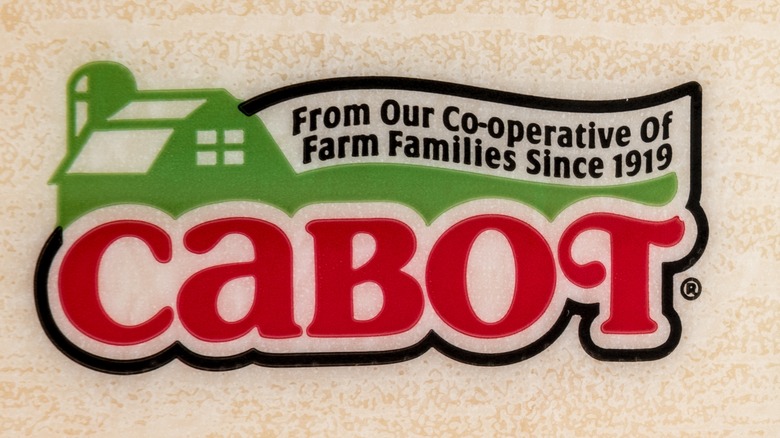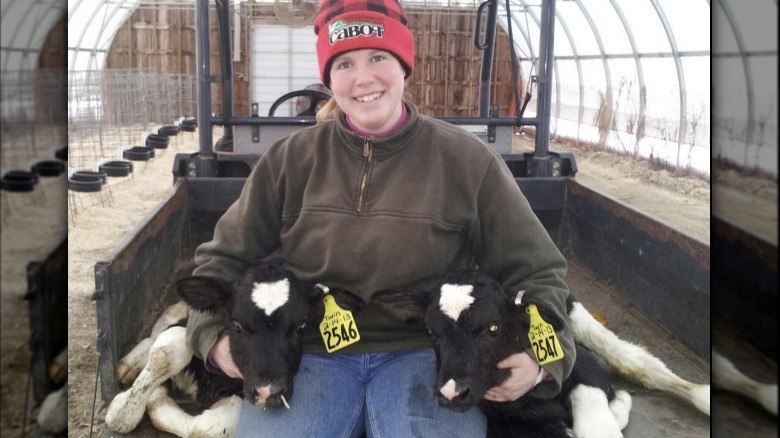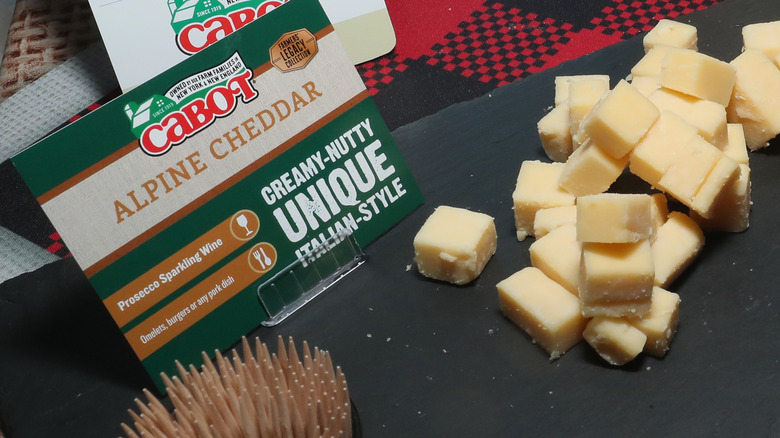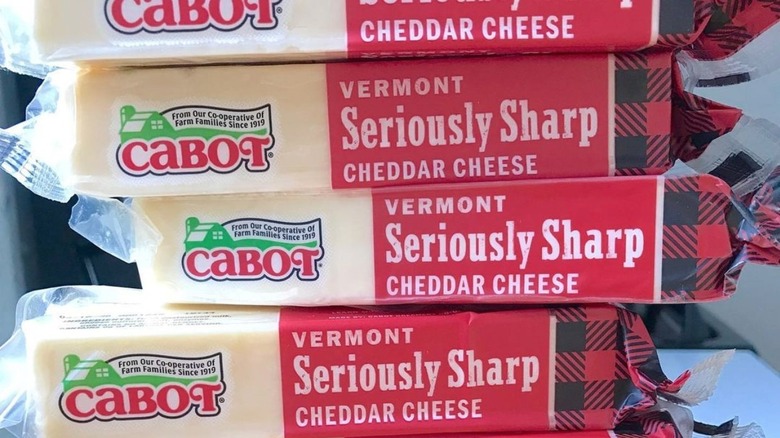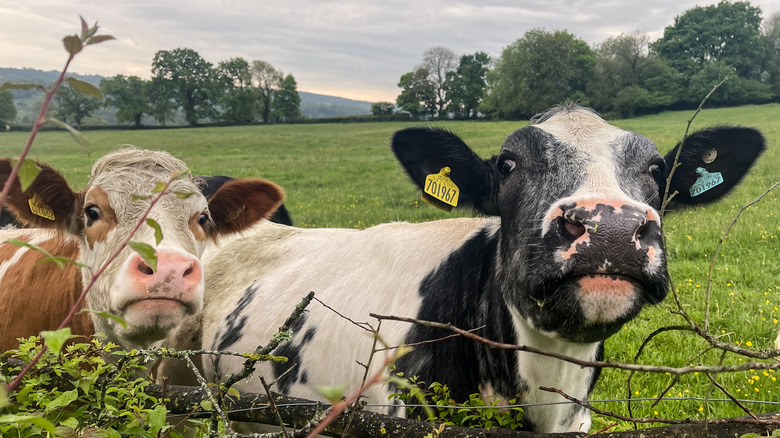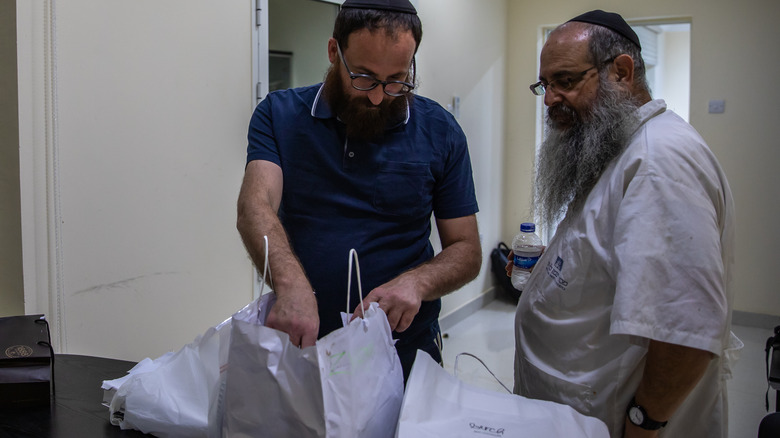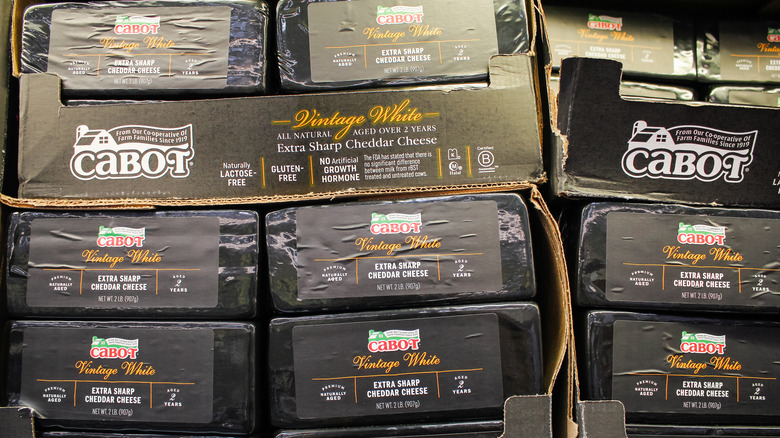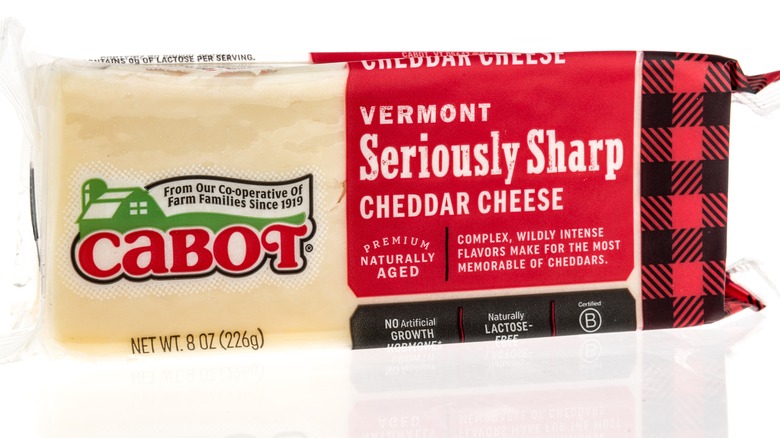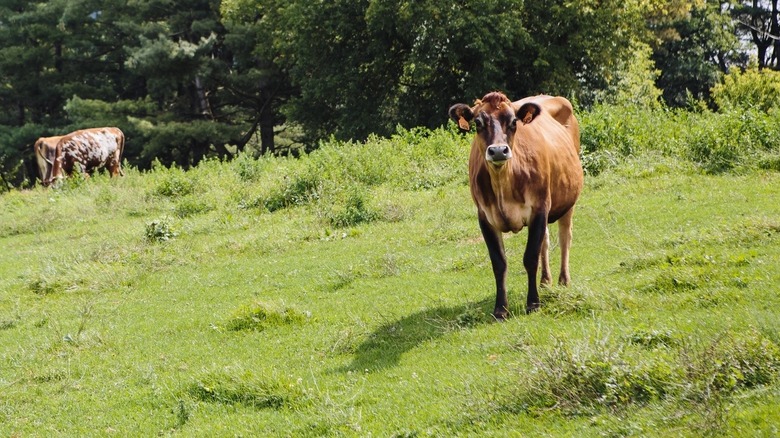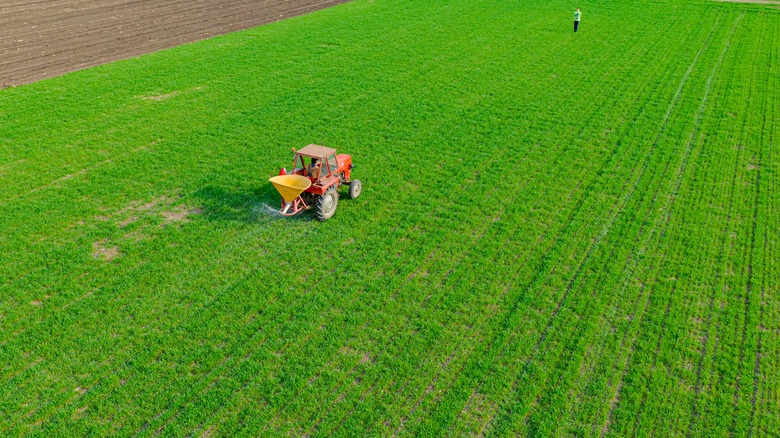What To Know Before Buying Cabot Cheese
Is there anything better than cheese? Frankly, there may be no food U.S. consumers love more than the irresistibly toothsome, almost mind-bogglingly versatile dairy product. Considering the average American ate 40 pounds of cheese in 2020 (roughly 2% of all food eaten in a year by the average person per the USDA), well ... it's not hyperbole to say the cheese stands alone.
Of course, like all things in life, not all cheese is made equal. Perhaps it's just a consequence of the modern world we live in, but reliable U.S.-based cheese brands — those that haven't devolved into overly-processed monstrosities — are fairly few and far between. Thankfully, when it comes to American-made cheese (not the hyper-processed, not-quite-cheese product known as American cheese), one brand has a virtually unmatched track record for producing mouthwatering, eternally satisfying cheeses: Cabot.
Cabot Creamery — which sells an assortment of other dairy products besides cheese — has been a fixture in U.S. homes for more than a century. Stretching back to its founding in 1919 (via Cabot), the consistently dependable brand is known for its superior quality, freshness, and taste. Of course, whether by experience or reputation, you're almost certainly already aware of how amazing Cabot cheese is. But there's more to this giant of the dairy industry than you likely know. So before your next trip to the cheese aisle, hitch a wagon towards the nearest farm with us and discover what to know before buying Cabot cheese.
Cabot is actually a co-op owned by 800 farms across the Northeast
As a widely popular, century-old business, many may assume Cabot has blossomed into an international behemoth over the years. It's certainly true that the dairy company's distribution network stretches far and wide, but contrary to what you may expect, Cabot isn't owned by any one person. In fact, the company is actually a cooperative business consisting of 800 farms and co-owners, according to Cabot Creamery.
Cabot was originally started as a co-op business in 1919 (via Burlington Free Press). As a co-op — a joint ownership business model, where each participating farm is an equal co-owner who agrees to, well, cooperate in all of their business practices — Cabot ensures each member has equal say in what happens. There's no one person running the show, in other words, and each member of the co-op can be certain their voice isn't ignored.
Like many other co-op businesses, Cabot follows the Rochdale Cooperative Principles, as well as the guidelines set forth by the International Cooperative Alliance. From its wholly voluntary member status to its expectation of equitable financial contributions from members (among other defined values and principles), it's clear Cabot does more than just talk the talk. When it comes to taking care of its co-op members, it walks the walk.
Its famed cheddar is made through a meticulous six-step process
Despite the unabashed love of all things cheese in the U.S., we can't imagine many cheese heads (even those outside of the Green Bay, Wisconsin area) know the precise process required for making it. Milk from Cabot farms doesn't just morph into cheese but requires six crucial steps before becoming the brand's beloved cheddar (via Cabot).
The first step involves pasteurizing fresh milk by heating it to 162 degrees Fahrenheit and holding that temperature for 16 seconds. According to Cabot, once its cheesemakers deem the pasteurized milk worthy, they proceed to the second step — adding rennet, a coagulating enzyme, to begin the cheese development phase. The third step (which we presume is Little Miss Muffet's favorite) involves separating the not-yet-cheese into curds and whey, while the fourth step involves draining off the liquid whey as the curds are cooked and further prepared.
Once the cheese curds are ready, Cabot proceeds to the fifth step of packing the curds into blocks weighing 42-pounds. This then leads to the sixth and final step, when Cabot's famous cheddar is aged inside a climate-controlled warehouse — which can take as little as three months or as long as five years.
Cabot has won dozens of awards through the years
Cabot's well-earned reputation isn't solely the result of people praising its products after consuming them. Well, sure — that does seem to have played a hand in the company's sterling image with the general public. But when Cabot proclaims it sells the world's best cheddar, it's not just some vain boast. It's a statement supported by the dozens (and dozens) of awards won by Cabot Creamery in numerous dairy competitions throughout its existence (via Cabot).
Though its first-place finish in the cheddar category at the 1989 U.S. Championship Cheese Contest may have been among its first big honors (via Burlington Free Press), Cabot isn't declaring its cheddar's greatness based on three-decade-old victories. In fact, according to the World Dairy Expo Championship in 2022, it still has the world's best aged cheddar ... and the world's best Colby cheese to boot.
Frankly, you don't need to take our word for Cabot Creamery's superior quality. Having won numerous first-place trophies for its cheeses (and several of its butter and yogurt products, as well), when it comes to U.S.-based dairy companies, Cabot is clearly the big cheese on campus.
Cheese graders sample every batch to properly categorize and label it
It may sound like the type of job a six-year-old would proclaim their dream career, but the position of cheese grader (not cheese grater) is no walk-in-the-park fantasy job. Well, actually, it is a dream-come-true position for the right cheese fanatic. But a near-unholy love of cheese isn't enough to become one of the very few professional cheese graders employed by Cabot — because an obsession with all things cheese is the bare minimum requirement.
If you've always assumed Cabot knows precisely which type of cheese it's making from the start, think again. In fact, because aging cheese is a "very tricky process" (via Cabot), the Cabot cheese graders are wholly responsible for the categorization of every block of cheese the company produces. Often working inside the company's 42-degree storage warehouses, cheese graders use a trier (a small, metal tool) to extract core samples from each block of cheese. The graders then feel, smell, taste, poke, and prod the cheese, examining its texture, color, flavor — basically anything you can think of — before determining the type and label for each block of cheese.
Not every dairy company utilizes cheese graders during the production process. But when pondering Cabot's track record (and its current status as the fifth best-selling cheese chunk brand in the U.S. in 2022), we can't help but wonder why every company doesn't follow its roadmap for success.
It strives to treat its cows with the utmost care and respect
The subject of animal cruelty can be a tricky one to navigate. Sure, most people prefer we provide animals with a modicum of respect and dignity, but it's a fallacy to say there's any real consensus regarding the best way to treat animals. Of course, you're more apt to be gentle and compassionate with animals if your entire livelihood depends on said animals. And since Cabot's farms rely on milk-producing cows, it's no surprise the company encourages participation in the National Dairy FARM (or Farmers Assuring Responsible Management) Program (via Cabot).
As a co-op business, Cabot doesn't appear to mandate how its member farms treat their cows, according to the company. Quite frankly, though, it doesn't seem like it needs to. After all, as Clara Ayer of Fairmont Farm (a member of the Cabot co-op) told Seven Days in 2019, she and her family aren't just "cow people," but their "cows are why [they] farm" in the first place.
Many Cabot farms, like co-op member Almeida Farm, have invested millions of dollars in technological advancements, including temperature-controlled barns and milking machines that provide cows autonomy over the milking process (via Fox Weather). And why wouldn't they? After all, since Cabot states on its website a "cow is most productive ... who is most contented," it's only logical they'd take continual steps to improve their cows' lives.
Cabot's cheese is often kosher, but not always Orthodox Union-certified
It can't be easy living your life according to a set of religious rules dictated by an ancient book. Thankfully, for those individuals who choose to live under such ordinances — like those who practice a kosher lifestyle — a number of well-known, quality brands offer products that meet those strict guidelines. This includes Cabot Creamery, which sells a number of kosher-certified cheeses and other dairy products (via Cabot).
To be clear, not every product sold by Cabot is kosher. To be considered kosher, a rabbi must supervise the production process. Since a number of Cabot's products are made at facilities it doesn't own or oversee, according to its website, it simply isn't feasible for the company to ensure every single product meets the requirements for kosher certification.
Frankly, this also explains why even fewer Cabot products (and virtually no cheeses) are considered kosher by Orthodox Union standards (a kosher certifying agency known for its stringent requirements). While it's unable to consistently produce cheeses that meet the high bar for OU certification, Cabot has actually made some OU-certified cheeses in the past, including batches of an eight-month-aged cheddar in 2005, 2007, and 2008 (via Orthodox Union).
Cabot didn't actually produce cheese for its first decade in business
Can you imagine a world where McDonald's didn't sell burgers during its entire first decade in business? "Inconceivable," you may declare. But sometimes, the truth is stranger than fiction, like the relatively incomprehensible reality that Cabot Creamery didn't produce or sell cheese, at all, until 1930 — 11 years after its founding (via Cabot).
Actually, all things considered, this seemingly mind-blowing fact is relatively unremarkable upon further analysis. Cabot was founded in 1919 by dairy farmers who produced butter (via VermontBiz). But with its member farms finding themselves overflowing with excess milk by 1930 — a year when there were more cows living in the state of Vermont than people (via Burlington Free Press) — the co-op decided to bring aboard its first cheesemaker.
Clearly, having won countless awards for its cheeses in the ensuing 90 or so years, Cabot made the right decision. But what would the world look like if Cabot had never taken that logical leap from butter to cheese? Frankly, even considering the notion is enough to make us shudder.
Its products weren't originally sold under the brand name Cabot
In our modern world, there's nothing unique about a company changing its name over time. Like Dunkin' Donuts becoming Dunkin', a company rebranding itself as it evolves and grows is fairly standard practice. Perhaps, then, it's not a surprise to learn Cabot didn't originally market its cheese and dairy products under the Cabot name, but first sold its butter under the brand name Rosedale (via Burlington Free Press).
According to the company, it didn't start producing and marketing dairy products under the Cabot brand name until 1960. But one has to wonder why it took the dairy co-op so long to make the switch from Rosedale to its more well-known, monumentally successful label — after all, the company was located in Cabot, Vermont.
Frankly, though, when it comes to Cabot's name, we can't help but think of Frank Costello's (Jack Nicholson) line in "The Departed" about cops and criminals. Because whether it's called Cabot, Rosedale, or another name entirely, when you're eating cheese from a Cabot co-op farm ... what's the difference?
Its Cow Power program recycles cow waste into energy
We're living in an energy crisis in 2022 — and it's not just the skyrocketing price of fuel or electricity due to inflation. The ever-increasing burdens of climate change on strained power grids across the U.S. means the time to implement newer and better energy sources is already upon us. Since cows are the number one source of agricultural greenhouse gases in the world (via UC Davis), it's understandable that Cabot Creamery would want to reduce its carbon footprint. Hence its embrace of the Cow Power program in recent years, which aims to recycle cow manure into an energy source (via Cabot).
Cows are Cabot's bread and butter, of course. But recognizing the detrimental impact of dairy farms on the environment, Cabot co-op member, Blue Spruce Farm, partnered with Green Mountain Power to become the pilot dairy farm in Vermont's cow-waste-to-energy movement. Using a device known as a digester, cow waste can be heated until it separates into liquid, solids, and gas. The methane gas is trapped (rather than released) and used for energy (via Greenwire).
Providing power to its farm and 400 surrounding homes, according to the company website, it's hard to argue with Blue Spruce Farm or Cabot's decision to participate in the Cow Power program. After earning an induction into the Vermont Agricultural Hall of Fame in 2019, we'd guess Blue Spruce Farm co-owner, Mary Audet, has no regrets, either.
Cabot reuses its water waste through a controversial practice called land spreading
Many consumers likely presume that Cabot, a seemingly wholesome, down-to-earth company, makes a concerted effort to negate any harmful impact it has on the environment. There's certainly some truth to that, and we'd never accuse the dairy co-op of intentionally or willfully polluting. But it's impossible to discuss its method of disposing wastewater, called land spreading, without acknowledging concerns previously raised by local residents about the untreated water's impact on the environment.
Some have called for the company to simply build a water treatment plant instead of land spreading. But Cabot maintains that it, along with several outside sources, has determined the construction and usage of a water treatment plant is impractical. Additionally, since the wastewater is only sprayed on land where the owner voluntarily allows it, it seems Cabot is unlikely to discontinue the practice anytime soon.
A former employee was found guilty of embezzling co-op funds in 2019
Thanks to The Osmonds, we know one bad apple don't spoil the whole bunch (girl). We'd have to imagine Cabot abides by this worldview, as well, at least when it comes to its employees. After all, if all of its employees were like Randall Swartz, who pleaded guilty to embezzling company funds in a mail fraud scheme in 2019 (via VTDigger), there's little chance it would survive a second hundred years in business.
Actually, the failed embezzlement scheme is fairly small potatoes when it comes to Swartz and his criminal career. Not to say his financial crimes were unworthy of prosecution, of course — although, according to the Burlington Free Press, his scheme to sell Cabot machine parts to maple syrup manufacturers is fairly amusing in a quintessentially Vermont way. But compared to the other felony he's been charged with — fatally shooting his wife, Thea, in 2018 (via AP News) — it seems fairly insignificant.
Having been sentenced to four years in prison for his admitted embezzlement scheme in 2019 (via WCAX), Swartz remains behind bars as of 2022. He also awaits trial for his second-degree murder charge, meaning there's a good chance he'll remain behind bars for the foreseeable future, even after completing the time for his Cabot crimes.
